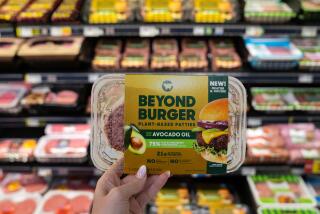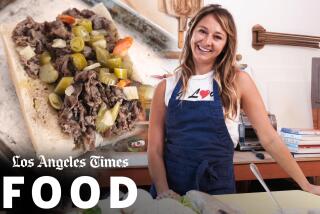Diet of Greens, Beer Turns Beef Into a Cash Cow
- Share via
GREENWICH, Conn. — Cattle rancher Fred Grant thinks that he’s found the secret to the perfect beef. First, feed the steers a steady diet of turnips, dandelions and garlic. Then let them wash it down with Budweiser.
The result is Brae Beef, an organic, additive-free meat that is one of the most expensive on the market. It retails for $3.95 a pound for burger, $8.95 for flank steak and a staggering $48 for tenderloin.
“There’s no question in my mind it’s the best beef in the world,” Grant said during a recent tour of his 36-acre farm, minuscule by ranchers’ standards.
Grant said laboratory tests have shown that his beef has 2% to 3.5% fat, compared to about 10% fat for the leanest grade of beef sold in supermarkets. Independent tests performed for Prevention, a health magazine, found Brae Beef samples to contain 3.3% fat.
Grant, a burly man who has suffered from a slow metabolism since childhood, has long been fascinated by theories on how to restore health through nutrition.
In 1970 he read an article about ancient Chinese medicine that claimed meat could be the perfect food. “The idea is that the body assimilates beef better than anything else if beef itself is perfect,” Grant said.
The former international banker left the fast lane of New York City five years later. He and his late wife, Anne--both Connecticut natives--bought Windabrae Farm, located on Greenwich’s border with New York’s suburban Westchester County.
Grant used family money to buy a herd of 36 Herefords at a bank auction in New Milford.
For the first seven years, he and his family did all of the farm chores, getting up at 5 a.m. to milk the cows, shovel manure, castrate and rope the animals.
He experimented with the herd’s diet. Eventually, he decided plants and vegetables--and Budweiser--was the way to go. Their diet also includes grass and burdock root, a wild prickly plant.
Grant won’t reveal how much beer his cattle drink. He claims that the brew makes the meat more tender.
His cattle are raised by contract farmers on farms in Virginia and West Virginia--usually about 750 head at a time--according to his specifications, then shipped to Windabrae for what he calls “the finishing phase.”
It is here that the steers--24 to 200 at a time--are fed diets tailored to their size and temperament and then shipped to upstate New York for slaughter.
Greenwich has a thoroughbred horse farm and another farm that raises exotic birds, but the idea of a cattle ranch didn’t sit well with some of Grant’s well-heeled neighbors.
“Three or four years ago we had terrible rains and all the manure piles started to move like glaciers,” he said. “The odor was ferocious and these people in Greenwich didn’t like it.”
He wasn’t ready to market his organic beef until 1982. But many health food stores turned him down for fear that customers weren’t ready to accept the notion of beef that was actually good for them.
So he opened his own Brae Beef outlet in the Stamford Town Center in 1983. Today, Brae Beef is sold mainly through mail orders, but also through a handful of gourmet food shops in Connecticut and New York.
More to Read
Sign up for Essential California
The most important California stories and recommendations in your inbox every morning.
You may occasionally receive promotional content from the Los Angeles Times.









